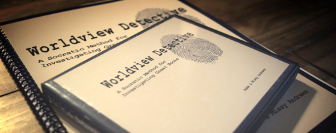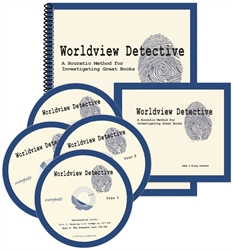Worldview Detective is ideal for those who are already familiar with Teaching the Classics by Adam Andrews. However, those who haven’t already learned Adams' techniques for teaching literature through Socratic discussions can pick up many of the literary analysis ideas through Worldview Detective. Like Teaching the Classics, this is a training course for parents that teaches them how to teach. This time, the emphasis is upon teaching worldview analysis and understanding when applied to literature for students in grades seven through twelve. While that is the intended audience, I have personally used similar teaching techniques with much younger children, using them on a limited basis and with age appropriate books or movies. Once parents understand the approach, they might well use it with younger children as well.
This is a four part presentation on three DVDs plus a fourth disc with a lecture on literary periods. The DVDs run for about three and a half hours in all. A spiral-bound syllabus book is to be used with the DVDs. Both components are essential.
In the first of the four DVD presentations, Adam and Missy explain the concept of worldview in general and of a biblical worldview in particular. They spend a good deal of time explaining why children need to learn to read literature with an understanding of the author’s worldview as expressed in each literary work. They also address the common concerns that Christian parents have about using non-Christian literature, showing how essential this is to help students understand other worldviews so that they can understand and empathize with those whom they want to evangelize.
Adam and Missy explain that a Christian’s job in analyzing literature is to, first, listen carefully to what the author is saying. Then they make a particularly interesting point about the biblical requirement to tell the truth. They apply this to literary analysis in that we need to accurately describe what an author says, to “tell the truth about their words.”
In Part 2, they present a lengthy list of worldview analysis questions, discussing the purpose of each question. They stress that parents won’t use the entire list of questions all of the time. These are just sample questions that identify important worldview elements. Parents might use some questions exactly as presented. They might present a variation of one or more questions. They might jump around rather than using them in order. The idea is to follow along a train of thought however that works best with a particular literary work and particular students. This is not a recipe to be followed exactly. As parents become more familiar with the key questions and as they practice using them, this becomes much easier.
Parts 3 and 4 walk parents through training exercises with two short stories, Jack London’s “To Build a Fire” and Flannery O’ Connor’s “Revelation.” Both stories have strong worldview elements that represent very different worldviews. The syllabus includes the full short story “To Build a Fire,” and parents should read that before watching Part 3.
On the DVD presentation for “To Build a Fire,” Mr. and Mrs. Andrews begin their conversation by discussing a few of the questions that would be used in a more general literary analysis of the structure of the story, questions such as “Who is the protagonist?” and “What is the setting?” This helps tie together analytical skills parents might have gathered in Teaching the Classics with those acquired in Worldview Detective. The discussion on the DVD is more complete and extensive than what is conveyed in the syllabus, so don’t skip the video aspect of the training.
For Part 4, you will need to find a copy of “Revelation.” It is not supposed to be in the public domain but it is available free online at this site linked here. I would recommend that parents who think that they have grasped the strategy try to respond to questions in the syllabus before watching the video training as a means of testing themselves. Of course, parents can always start with the video presentation if they prefer. Mr. and Mrs. Andrews begin this discussion again by addressing structural questions before delving into the worldview questions.
The syllabus has space for notes from the first presentation and the list of Socratic questions presented in Part 2. In the syllabus, along with Jack London's story, Part 3 presents a sample discussion that is somewhat similar to what is presented on the DVD. The syllabus for Part 4 has minimal information, primarily providing key questions to address with space to write out responses.
On the fourth DVD, Adam Andrews presents a short course in the “Major Periods in English Language Literature.” This is not an essential part of the course, but it should be very helpful to parents unfamiliar with this information since it helps the reader better understand the setting, values, customs, and attitudes an author might convey in a literary work. This presentation is repeated in an appendix of the syllabus.
The syllabus has two other appendices with an article on “A Warning Against ‘Christian Deconstruction’” and “A Summary of Some Prevalent Worldviews.”
Summary
The approach taught by Adam and Missy Andrews in Teaching the Classics is so valuable that I have included that course among my Top Picks. While Worldview Detective can be used on its own, it works best as a followup to Teaching the Classics. If parents become familiar with the Socratic questions for analyzing literature that are taught in these courses and use them with their children, their children will almost certainly learn to become discerning readers who automatically think of the questions on their own as they read and watch movies.










